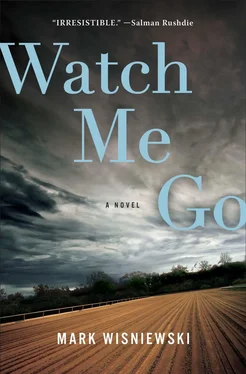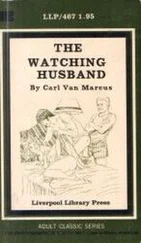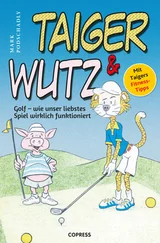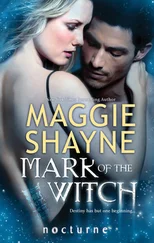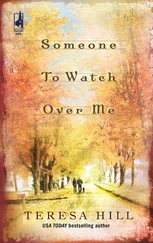“So what do we do?” I ask.
“Key the one and the three with every other horse.”
“Which means what?” James asks.
“If the one and the three finish first, second, or third, we collect.”
“Sounds good,” James says.
“But they both have to finish in the top three.”
“Sounds tough,” I say.
“It’s as easy as I can make it,” Bark says.
“How much would we win?” I ask.
Bark shrugs. “Anywhere from double our money to a ton.”
“But like you say, what good is double our money?”
“Deesh,” Bark says, “we gotta leave here with something .”
Which tells me that, today, he’s lost faith in horses. If it were yesterday, or any day before we moved that drum, he’d have enough faith for the three of us. But it’s today. It doesn’t matter that he’s got more cash in his pocket than he’s ever had at the track. Today is today is today.
We all three sit. The horses walk onto the track, a jockey on each. Then Bark stands and says, “Let’s do it,” and James and I follow him under the grandstand to the betting windows, where we wait in a short but slow line. Finally, Bark leans in close to our teller, an old white lady. He talks so quietly she needs to lean, too, and then he pulls out the cash and hands it over for a ticket he reads even after his feet begin to shuffle off.
“Gentlemen!” the teller shouts. “Your change?” She’s holding three twenties, and James jogs back to her, takes them, gives one apiece to me and Bark, then stuffs the third in his pocket. We walk back out toward the homestretch, and it hits me I might have done something for a twenty I’d never do again for all the money in the world.
Bark veers left, toward the bench near the homestretch. “Shouldn’t we watch closer to the finish line?” James asks, but Bark keeps on. James stands still, knees locked, yakking about how what we’d see from that bench won’t matter. About how he wants to eyewitness the very end. About how, if all of us shout enough near the finish line, we could affect whether we win or lose.
“Go ahead and shout,” Bark says. “I’m gonna watch from here.”
James huffs off, leaving me to decide who to watch with. I don’t follow him since the last thing I need is the sound of his voice. I don’t sit beside Bark since I’m pissed he’s the reason I went upstate. I stand where I am, partway between Bark and the finish line — in front of the odds board beyond the dirt where they’ll run. It all of a sudden doesn’t mean shit that the three of us won state twice together, hung together on countless nights since, might end up together in Mississippi for the rest of our lives. We’re all strung out along that wire fence like cousins who never met, each of us as alone as the skinny drunk beside me, all of us as stuck inside ourselves as whoever’s rotting in that drum.
And we stay like that until the horses are in the gate.
THE WAY THE CORCORANShad it set up then was the three upstairs bedrooms went one each to Tug and my mother and Tug’s parents, whereas I’d sleep on the first-floor summer porch, a long narrow room surrounded by three walls of windows, the widest facing the lake. During the day, this room was the best because all around were thick oak trunks and shiny rhododendrons and white blooming wisteria, and there was a family of chipmunks who spied on you and redheaded woodpeckers who charmed you by working upside down, and at any time a metallic green hummingbird with a scarlet throat might zing past as fast as a falling star, sip from a purple clematis, then dart to a lily the color of a conch shell’s throat, with the jade and aqua and shimmering lake behind everything.
But at night, if you couldn’t sleep, you’d hear creaks in the narrow ceiling overhead, let alone voices up there, sometimes hissed words if not clearly angry phrases, always between Tom and Colleen, often about money. And on my first night beneath such creaks and those voices, I lay under a lent comforter on the cot alongside that porch’s only privacy-assuring wall, and outdoors beyond that enchanted yard loomed that same body of water, waves on it throwing moonlight at me, reflected brightness lapping along plasterboard inches from me if even a meek breeze rose, telling me more directly than any voice above me that, yes, let’s not deny it, girl: You lay within a furlong of the lake that took your daddy twice — first when he drowned, again when your mother scattered his ashes from that pier.
And the longer I got worked up about how much easier my life could have been if my father hadn’t drowned, the more I wanted to leave that porch, though doing so would risk running into a Corcoran, which I did not want to do. What I wanted was to get away from both the lake and the Corcorans, maybe go out in the yard between the house and the road, maybe, if I could muster the spine, follow the path through the woods south of the house to Tug’s horse farm. Horses had long, long been my means of escape; riding them helped me avoid people I didn’t like, and on a saddled horse you also had more power than anyone who stood on human feet. Naturally, then, in the middle of that first night I spent in the Corcorans’ house, I wanted to see a filly or a colt I might take a liking to. Gnawing at me still was Colleen’s caginess during dinner at the kitchen table that evening, when I’d addressed no Corcoran in particular to ask how many horses Tug had in his care; she’d grown all at once interested in whether Tom believed muskies were biting, as if there’d been something about Tug’s farm she wanted kept secret.
Anyway I might have been more curious than brave when I pulled on my jeans and sweatshirt and sandals and tiptoed from the summer porch through the musty living room into the kitchen, which was lit by a high-watt bulb in a frosted fixture. I took two McIntoshes from the cracked ceramic bowl on the cherrywood table and, feeling not only brave but also generous now that each of my hands could offer a horse a surefire gift, escaped through the roadside door.
The lawn out there was a long stretch of crabgrass split by a path of flagstones sunken by rain and time and the weight of an unknowable number of horse folk, and it struck me that my father himself had probably walked on those stones, his actual flesh-and-bone feet pressing each a microscopic bit deeper, and this realization saddened me. If he hadn’t drowned and were still alive, I thought, he and I might be talking now, and I headed left, then into the woods south of the lawn.
And in those woods I kept to the path Tug had cleared, a trail just wide enough for thoroughbreds. I pressed on guided by the same moonlight that had haunted me on the summer porch, and between the crowns of the trees on either side of me were also stars strong enough to not only guide you but also to get you to thinking about eternity and family and afterlife and anyone you really cared about, and I wondered: Is it through one skinny ray — from the least visible star — that dead fathers communicate with daughters? Or is it through sunshine?
And I did choke up a little while wondering this, but then I told myself to focus on the future, on how I might be minutes from meeting horses, maybe one who’d prove as wild about being ridden as I was about riding. Filly, mare, colt, gelding, bay, roan, chestnut — no distinction would matter if this horse would love to run with me — and then things went black thanks to a huge boulder on my right, more of a cliff, really, a slice of the earth’s guts forced out past its skin by a glacier, it seemed. And the darkness here was thick enough to bring to mind bears and wolves and overly aggressive mama raccoons, but it also made the stars directly above seem brighter — trying to connect with my father was only a matter of looking up — and I stopped walking, as if stillness might help me hear my father telling me, through the brightness of those stars, whatever he had to say, maybe, I imagined, something like: I walked there, too. And, yes, I’ve long loved you.
Читать дальше
